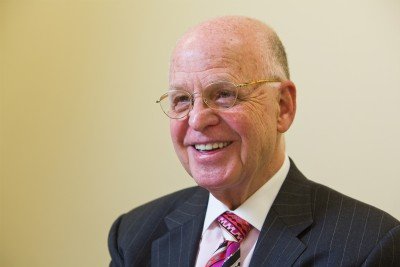Jerry’s Story
Jerry, 65, was on a business trip when he woke up in pain and noticed blood in his urine. Tests revealed muscle-invasive bladder cancer, an advanced form of the disease. Faced with having his bladder removed and losing sexual function, he came to Memorial Sloan Kettering. The bladder cancer team used a nerve-sparing surgical approach to remove the tumor and create a new bladder, preserving his sexual function.

In April 2004, Jerry Drogin, 65, was out of town on a business trip when he woke up in the middle of the night in pain, went to the bathroom, and saw blood in his urine.
Back at home a few days later, his urologist scheduled a number of tests, including a cystoscopy — a biopsy of bladder tissue performed using a thin, lighted instrument inserted through the urethra. To his great dismay, the results revealed that he had muscle-invasive bladder cancer — an advanced form of cancer in which the tumor penetrates the bladder’s lining and grows into the muscular wall of the organ.
When the initial shock of the diagnosis wore off, his urologist urged him to go to Memorial Sloan Kettering Cancer Center. Remembering the moment today, Jerry says, “My doctor explained that they use a surgery that gives people like me a chance to remain active after the cancer is removed.”
Jerry’s urologist suggested he might benefit from a neobladder urinary diversion procedure, an approach in which the surgeon removes the bladder and tumor, and then constructs a new bladder from a segment of intestine. The new bladder is connected to the urethra, allowing the patient to urinate normally, and avoiding the need for him to wear an external collection bag.
Taking his doctor’s advice, Jerry made an appointment immediately.
First Step — Chemotherapy
Before undertaking surgery for muscle-invasive bladder cancer, however, Memorial Sloan Kettering’s bladder cancer treatment team starts patients with several months of chemotherapy. The goal is to kill microscopic tumor cells that may have spread outside the bladder first, increasing the chance of a successful, curative surgery. As Suzen, Jerry’s wife of 35 years, recalls, “The doctors explained that even though the cancer appeared to be localized, just in case there was something floating around in the body, the chemo would get it first.”
For those first five months, Beverly Drucker, a medical oncologist specializing in the treatment of bladder cancer, oversaw Jerry’s care. “Dr. Drucker guided me through every step that I would go through with chemo,” he says. (Having since left Memorial Sloan Kettering, Dr. Drucker is now a physician at Greenwich Hospital, in Connecticut.)
Jerry handled the five months of chemo very well — the only symptom he experienced was extreme fatigue. As his wife recalls, “Jerry didn’t lose his hair. He never threw up. But he would have chemo on a Friday, and on Sunday he would go to sleep and wake up Wednesday.” Laughing, Jerry says, “I would call it a Rip Van Winkle disease!”
A Hug and a Neobladder
Midway through the chemotherapy regimen, Jerry and his wife started to discuss surgical options with Dr. Drucker. Understanding that Jerry still hoped to receive a neobladder, Dr. Drucker recommended that he meet with Memorial Sloan Kettering urologic surgeon Bernie Bochner to discuss his options.
“When he came in, Dr. Bochner asked me what I wanted,” Jerry recalls. “I told him that I needed a big hug and a neobladder. He came over, hugged me, and told me he probably would be able to give me a neobladder.” Dr. Bochner explained that, for a number of reasons, the operation isn’t an option for all patients. But having reviewed Jerry’s scans, he thought he would be a good candidate.
Jerry confessed that in addition to his fear of having to wear an external collection bag, one of his greatest concerns was whether he would retain sexual potency (the ability to have an erection) after the operation. Instantly setting his mind at ease, Dr. Bochner told Jerry that for many patients, it is possible to perform a nerve-sparing approach to ensure that potency is maintained. He also told him about his colleague, John Mulhall, a urologic surgeon who specializes in sexual and reproductive medicine, who would work with Jerry to restore his sexual function following surgery.
Hearing all of this was such a great relief, Jerry recalls, that “for the first time since the start of my treatment, I cried.”
From that first meeting, Jerry was very pleased with the care he received from Dr. Bochner. “Dr. Bochner, as far as I’m concerned, is one of the most compassionate people I know,” he says. “I consider him a dear friend and a blessing to the medical community.”
The Whole Spectrum of Care
As surgery was nearing, Jerry met with Dr. Mulhall to talk about sexual rehabilitation so he could know exactly what to expect. He found the appointment very helpful: “What Dr. Mulhall did was give me the rays of hope I needed to go into surgery,” he recalls. Jerry recommends that all bladder cancer patients have this conversation with their doctors before surgery because, for him, it made the whole experience less scary.
Around that same time, Jerry and his wife also started attending bladder cancer patient support meetings led by Memorial Sloan Kettering’s Richard Glassman, a clinical social worker who specializes in patients with urological (genitourinary) cancers. His wife and four daughters also met individually with Mr. Glassman for private counseling sessions, enabling them to talk openly and ask questions they had been too scared to ask before.
“I know that a lot of people feel that you should not include your children, that you should spare them,” says Suzen. “But 99 percent of the time what goes on in their mind is worse than anything in reality. The girls — the oldest of whom is 44 — were so frightened and overwhelmed, and they each needed their own tools to work with, that they could not get from us.”
Taking advantage of a variety of support services offered by Memorial Sloan Kettering, the whole family felt more in control of the situation and learned ways to communicate with each other about their fears regarding Jerry’s cancer.
A Successful Neobladder Operation
When the day of surgery finally came in January, Dr. Bochner was able to perform a nerve-sparing cystectomy and neobladder. During the operation, they tested 45 lymph nodes to make sure that the cancer had not spread beyond the bladder — all were negative.
Jerry’s recovery went relatively smoothly, but because the neobladder is made out of a piece of intestine, it can take some time to develop into a functional bladder replacement. With time, the neobladder stretches to hold more urine, enabling the recipient to go longer amounts of time between trips to the bathroom. To help him through those first few months, Jerry says, “Suzen found me a watch that I could set and wear at night, and it would vibrate to wake me.” At first, he set the watch to remind him to urinate every two hours. Later he was able to extend this to every three hours, and even longer after that.
The sexual rehabilitation process, which Jerry began a month after surgery and has continued with to this day, has also been very successful. “Dr. Mulhall has given me everything I wanted,” Jerry says.
Keeping a Positive Attitude

Throughout his treatment Jerry stayed positive and upbeat — even on days when he experienced long waits to see his doctors. “On days that I had a clinic visit, I came for the entire day,” says Jerry. “I can’t say it enough that when you go to clinic, bring a book or anything to keep you occupied so that you don’t become impatient. When they kept me waiting, it meant that Dr. Bochner was seeing someone who needed the care more urgently than I did. When it was my turn, it would be my turn, and I never looked at my watch. He always made me feel that I was his only patient.”
To show his appreciation for the people working in the clinic, Jerry always brought a big box of cookies as a way of saying thank you for all they were doing for him. Echoing her husband’s sentiment, Suzen says, “I cannot say enough about the caliber of the staff, the attitude of everyone — and I’m talking about the porters on up.”
Recovery & Beyond
Two months after Jerry’s neobladder surgery, just as he and his family were easing back into their lives, Suzen was diagnosed with breast cancer, and the caregiver roles reversed. Having just been through Jerry’s bladder cancer, the whole family was better equipped to handle Suzen’s diagnosis and subsequent treatment. Although it took more than a year, her treatment was successful, and life has finally returned to normal.
Jerry’s self-described role as “Sloan’s Poster Patient” did not end with his treatment. Since then, Dr. Bochner tapped Jerry to become a patient-to-patient volunteer, a role that allows him to talk about his experience and share advice with other men and women. Richard Glassman also refers patients to Jerry and Suzen, which has been very meaningful for them.
The couple realizes that not all people diagnosed with bladder cancer can come to New York City for treatment, but they would still encourage anyone to at least get a second opinion at Memorial Sloan Kettering. “There are certain institutions in the country that specialize in bladder cancer,” says Suzen. “Memorial Sloan Kettering is one. And if you feel that you live too far away for the follow-up, the chemo, or whatever other follow-up treatment, the protocol can be set here and you can receive your care close to home.”
In the summer of 2009, Dr. Bochner invited Jerry to be one of the keynote speakers at the Bladder Cancer Advocacy Network (BCAN) national meeting in Jackson Hole, Wyoming. (BCAN is an organization whose mission is to increase public awareness about bladder cancer; to advance bladder cancer research; and to provide educational and support services for the bladder cancer community.) In addition to clinicians and patients, the audience included basic science researchers. Jerry and Suzen enjoyed the experience so much that they plan to go back next year.
Now cancer-free for five years, Jerry expresses deep gratitude for Dr. Bochner, who has given him so much. “To you, Bernie, you modest man, thank you,” he says. “Thank you for being my doctor and my friend. You are always there when I need you.”
We’re available 24 hours a day, 7 days a week


